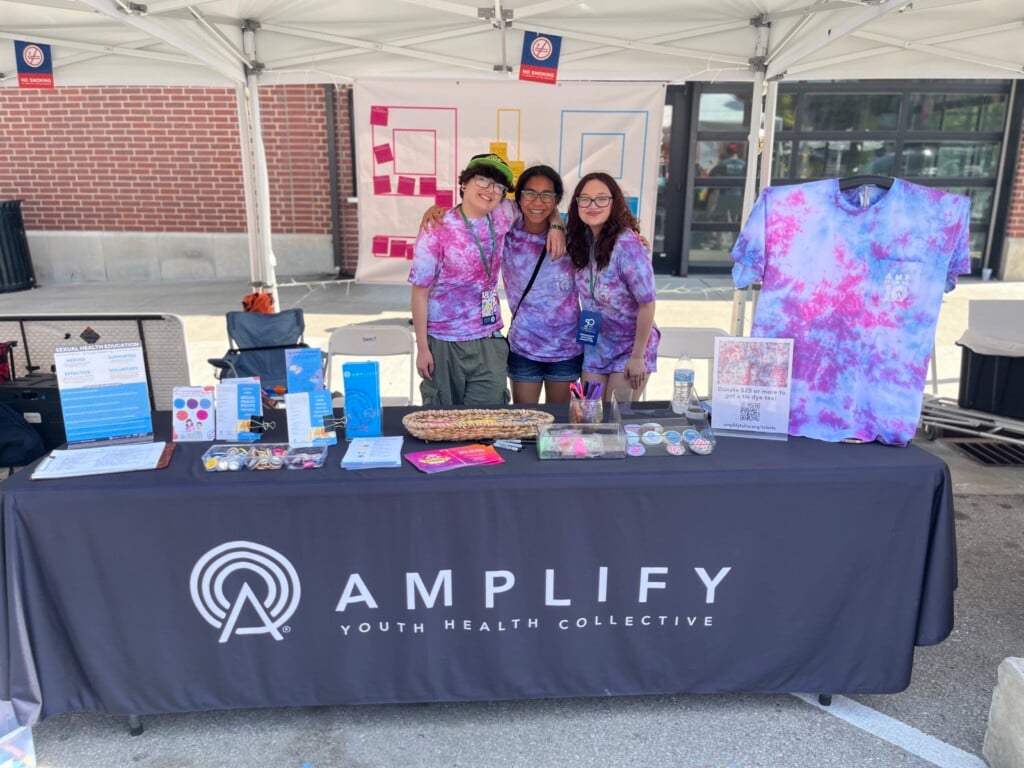Having “The Talk”: Amplify Can Help

If you’re struggling to talk to your teen about sexual health, you’re not alone. Middle school memories of awkward conversations and cringe-worthy graphics on an overhead projector still haunt many of us. However, the topic is an important one, especially in the digital age when kids, quite literally, have a world of (mis)information at their fingertips. Fortunately, Tulsa nonprofit Amplify Youth Health Collective is here to help. The organization is dedicated to advancing youth sexual health and well-being and is a resource for educators, parents and kids alike.
“Sex ed is about so much more than just preventing pregnancy,” says Heather Duvall, Amplify’s executive director. “It’s about learning what healthy relationships are. It’s about understanding what consent is. It’s about sexual violence prevention and more.”
Amplify, which began in 2013 as “Tulsa Campaign to Prevent Teen Pregnancy,” takes a collaborative approach to its mission, partnering with youth-serving organizations like Tulsa-area schools, Youth Services of Tulsa and the Tulsa Health Department, to provide training and resources to empower youth with the information and support they need to make healthy decisions in their own lives.
That’s challenging work, especially in a state with the fourth highest teen birth rate in America. In order to “educate, collaborate and advocate” to improve the lives of Tulsa youth, Amplify brings everyone into the conversation, including the youth themselves.
“Our Youth Leadership Council is made up of young people who are peer advocates for sexual health,” Duvall says. “It’s really a leadership development program focusing on our mission, which is advancing sexual health and well-being. We work with about 15 young leaders from the Tulsa area every year.”
Seeing Results
The good news is that the efforts of organizations like Amplify appear to be helping. Between 2009 – 2020, Tulsa County saw a 57.7% decrease in the teen birth rate.
“Teen birth rate isn’t the only indicator, but it is an indicator, of healthy communities,” Duvall notes. “I want to emphasize that young people are the ones who are making healthy decisions for themselves. That teen birth rate wouldn’t have declined if young people weren’t choosing safe and healthy options for themselves.”
Amplify provides training opportunities for youth-serving professionals, healthcare professionals and sexual health educators. The training covers foundational sexual health knowledge and best practices, such as trauma-responsiveness, cultural humility, inclusivity, monitoring personal values and answering sensitive questions. The organization also has several initiatives to support some of Tulsa’s underserved populations, including programs specifically for Spanish-speaking students and customized materials for students with disabilities.
“Sexual health education is more important than ever,” Duvall says. “Giving young people the information, resources and education to help them plan for their futures is one of the most important things we can do. Amplify is here to support young people, parents, schools and the entire community to understand adolescent sexual health better, which can build the foundation for a lifetime of favorable health outcomes and healthy families.”
For more information, visit amplifytulsa.org.
Teen Talking Tips
(adapted from amplifytulsa.org)
Initiate the discussion – Find the right time and place with minimal distractions. Talking while engaging in another activity, like walking the dog or riding in the car, can feel less threatening.
Find and use teachable moments – Look for songs, news articles or TV shows that can springboard a conversation about consent, healthy relationships, etc., and ask your child open-ended questions to start the conversation.
Empathize with your teen – It can be uncomfortable to talk about sex. Be honest about your feelings and use empathy to create a safe and supportive environment.
Listen without judgment – It’s important for your teen to feel heard and not judged. Ask open-ended questions and listen.
Recognize what you don’t know – It’s okay not to have all of the answers. If you don’t know the answer to your child’s question, let your child know and offer to find out.
Be the louder and more influential voice – Talk with your child about what media and social media portray and what you think about it. Encourage critical thinking about the streaming, music and social media they see and how to set their own limits.
 Julie Wenger Watson is a freelance writer who’s worked in all aspects of music promotion. She’s also Co-Director of “Live From Cain’s,” a public radio show pilot.
Julie Wenger Watson is a freelance writer who’s worked in all aspects of music promotion. She’s also Co-Director of “Live From Cain’s,” a public radio show pilot.





